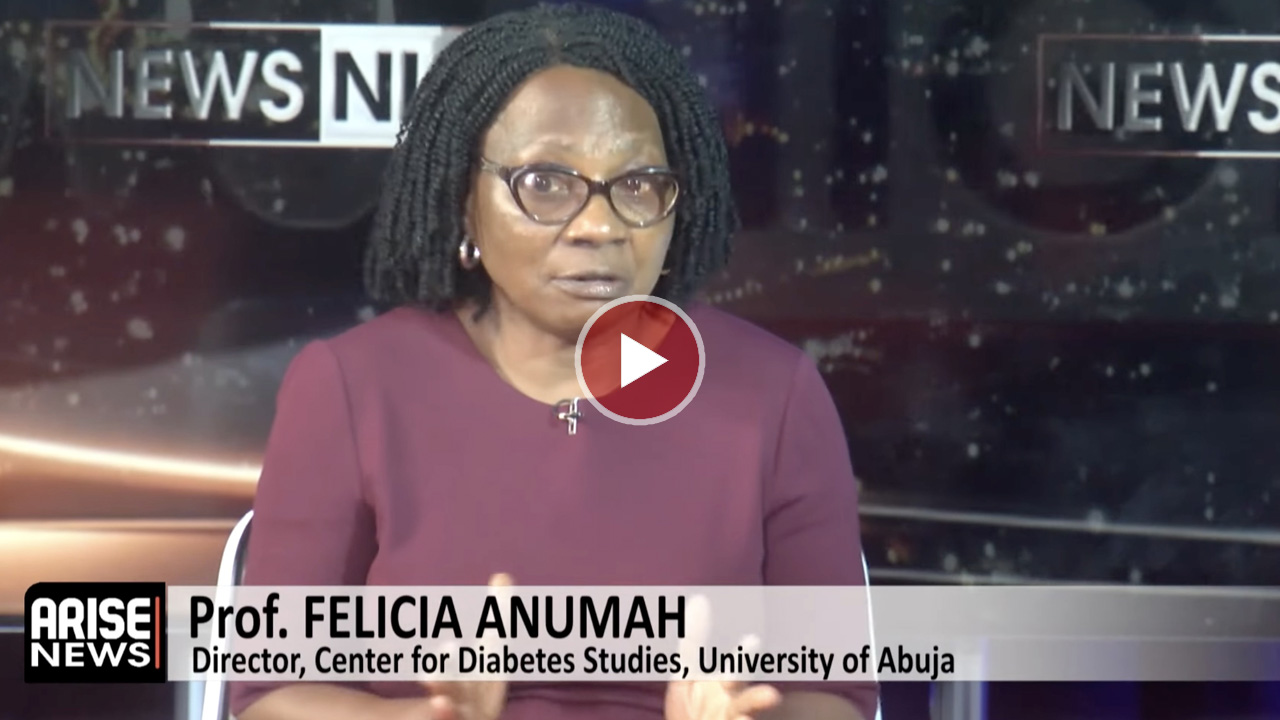

Director of the Centre for Diabetes Studies at the University of Abuja, Professor Felicia Anumah has warned that Nigeria may be confronting a far larger diabetes crisis than previously known, with new national data expected to reveal significantly higher prevalence levels.
Anumah issued the warning during an interview with ARISE News on Friday to mark World Diabetes Day 2025. “As of 2018, the prevalence that we had was 5.77%. That’s about 11 million Nigerians with diabetes. But I can tell you that even that is underreporting. Luckily, the Federal Ministry of Health, in collaboration with the World Health Organisation and Global Fund, has carried out a national survey on non-communicable diseases, including diabetes.
“I believe the study is being analysed now, a report is being written, and we are going to have something closer to what exactly it is. And I can assure you, it’s going to shock Nigerians.”
Her comments come amid rising calls — including from the Diabetes Association of Nigeria — for the Federal Government to declare a state of emergency on diabetes due to its growing burden.
Prof Anumah stressed that millions may remain undiagnosed because diabetes often progresses quietly.
She explained:“Diabetes is such a complex disease that it can be silent until the onset of complications. People go about their business with high blood sugar, but because they are not feeling pain, they think they are okay. Meanwhile, it is causing quiet damage until people present with kidney failure, strokes, or gangrene that leads to amputation.”
She said many Nigerians only discover they have diabetes when severe complications emerge. To address this, she urged mandatory blood sugar checks at every hospital visit:
“What the Federal Ministry of Health is advocating is that any opportunity for anybody to get to a hospital, for whatever reason, blood sugar should be checked — beyond the blood pressure, of course.”
According to Prof Anumah, 90–95% of diabetes cases in Nigeria are Type 2 diabetes, which is largely driven by lifestyle choices.
She said:“Ageing is a risk factor. As we age, metabolic changes tilt the body naturally towards the disease side of life. Blood sugar rises with age.
The next risk factor is family history. If one parent has diabetes, any of the children has a 40% chance of having it. But there is a 60% chance in your hand to live right and not have it.”
She identified overweight and obesity as major contributors:
“For every height, there is an ideal weight. When your weight exceeds what that height is meant to carry, that is the beginning of the problem. Weight alone can bring diabetes or hypertension, even without family history.”
Prof Anumah urged Nigerians to regularly check their Body Mass Index (BMI) and waist circumference, noting:
“If a man has more than 40 inches around the waist, he has accumulated something he needs to get rid of. For females, more than 35 inches. It is not evidence of good living. The most sensitive indication that diabetes or hypertension is coming is the waist circumference.”
But she noted that culture often undermines healthy choices:
“In our environment, when you have weight, you are respected. If a married woman is not adding weight, it is imagined that her husband is not taking good care of her. People love to be respected, so they prefer the weight.”
She also highlighted cooking practices that contribute to obesity:
“In some cultures, oil is evidence of richness. Our foods are heavily soaked in oil. Too much oil is a reason for weight gain.”
While asked about oil types, she stressed:
“In our clime, we should use all oils sparingly. Moderation is the key word.”
Prof Anumah clarified misconceptions about who can develop diabetes:
“We have different types of diabetes. Type 1 occurs more in children and is not related to lifestyle. But unfortunately, we are now beginning to see Type 2 diabetes in children because of overweight and obesity.”
On whether sugar-sweetened beverage taxes can reduce Nigeria’s diabetes burden, Prof Anumah — a member of the Coalition for Sugar Reduction in Beverages — strongly endorsed the policy.
She said:“Anything that is sweet contains refined sugars. They are easily absorbable and run straight into the blood. When blood sugar is high, the pancreas must push out insulin to bring it down. When you harass this organ for too long, it gets exhausted — and when it does, there is no coming back.
Sugary things harass the pancreas. That’s why sugar tax is important: it will reduce consumption. We are saying, preserve this organ to see you to old age.”
She also cautioned against the widespread belief that bitter foods automatically protect against diabetes:
“It is not necessarily so that if you take all the bitter things, they will treat or prevent diabetes.”
Prof Anumah concluded by emphasising the need for lifestyle change, awareness, and proactive health checks to avert a worsening national crisis.
“People need the information to live right,”she concluded.
Boluwatife Enome



